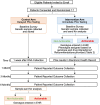Rationale and design for a pragmatic randomized trial to assess gene-based prescribing for SSRIs in the treatment of depression
- PMID: 38860639
- PMCID: PMC11165462
- DOI: 10.1111/cts.13822
Rationale and design for a pragmatic randomized trial to assess gene-based prescribing for SSRIs in the treatment of depression
Abstract
Specific selective serotonin reuptake inhibitors (SSRIs) metabolism is strongly influenced by two pharmacogenes, CYP2D6 and CYP2C19. However, the effectiveness of prospectively using pharmacogenetic variants to select or dose SSRIs for depression is uncertain in routine clinical practice. The objective of this prospective, multicenter, pragmatic randomized controlled trial is to determine the effectiveness of genotype-guided selection and dosing of antidepressants on control of depression in participants who are 8 years or older with ≥3 months of depressive symptoms who require new or revised therapy. Those randomized to the intervention arm undergo pharmacogenetic testing at baseline and receive a pharmacy consult and/or automated clinical decision support intervention based on an actionable phenotype, while those randomized to the control arm have pharmacogenetic testing at the end of 6-months. In both groups, depression and drug tolerability outcomes are assessed at baseline, 1 month, 3 months (primary), and 6 months. The primary end point is defined by change in Patient-Reported Outcomes Measurement Information System (PROMIS) Depression score assessed at 3 months versus baseline. Secondary end points include change inpatient health questionnaire (PHQ-8) measure of depression severity, remission rates defined by PROMIS score < 16, medication adherence, and medication side effects. The primary analysis will compare the PROMIS score difference between trial arms among those with an actionable CYP2D6 or CYP2C19 genetic result or a CYP2D6 drug-drug interaction. The trial has completed accrual of 1461 participants, of which 562 were found to have an actionable phenotype to date, and follow-up will be complete in April of 2024.
Trial registration: ClinicalTrials.gov NCT04445792.
© 2024 The Author(s). Clinical and Translational Science published by Wiley Periodicals LLC on behalf of American Society for Clinical Pharmacology and Therapeutics.
Conflict of interest statement
The authors declared no competing interests for this work.
Figures




References
-
- Taylor WD. Clinical practice. Depression in the elderly. N Engl J Med. 2014;371(13):1228‐1236. - PubMed
-
- Johansen ME. Psychiatric medication users by age and sex in the United States, 1999–2018. J Am Board Family Med. 2021;34(4):732‐740. - PubMed
-
- Noordam R, Direk N, Sitlani CM, et al. Identifying genetic loci associated with antidepressant drug response with drug‐gene interaction models in a population‐based study. J Psychiatr Res. 2015;62:31‐37. - PubMed
-
- American Psychiatric Association . Practice guideline for the treatment of patients with major depressive disorder (revision). Am J Psychiatry. 2000;157(4 Suppl):1‐45. - PubMed
Publication types
MeSH terms
Substances
Associated data
Grants and funding
LinkOut - more resources
Full Text Sources
Medical
Miscellaneous

